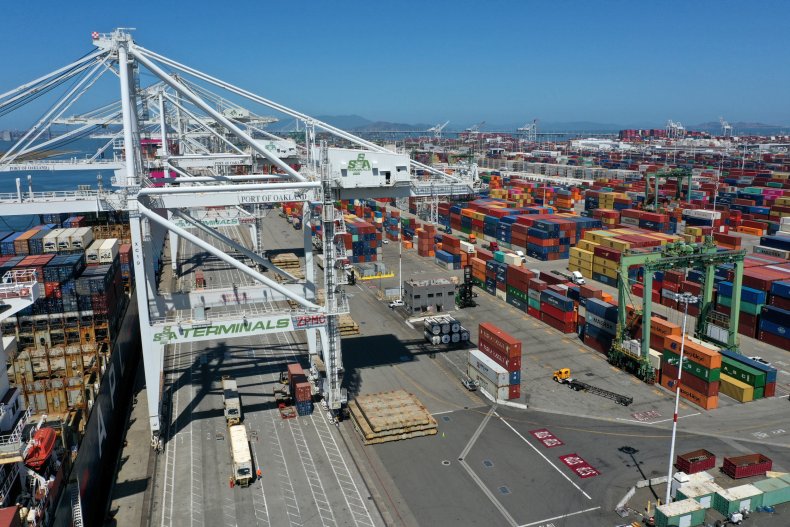Over the last month, the anti-Israel boycott, divestment and sanctions (BDS) movement has formed a new offensive in West Coast ports such as Oakland and Seattle. The "Block the Boat" initiative organizes protests to block or disrupt shipments that organizers designate as affiliated with Israel, focused primarily to date on the Israeli shipping giant ZIM, despite the fact that as a publicly traded company, ZIM no longer has a formal affiliation with the government of Israel. Block the Boat has already managed to turn away one ZIM ship and delay operations for several others, revealing larger weaknesses in our port security that must be addressed before a local, limited nuisance becomes a national supply-chain crisis.
Emboldened by the recent outburst of noxious anti-Semitism in America following the violence between Israel and Hamas in Gaza last month, Block the Boat was able to exploit a complicated mix of factors, such as nebulous jurisdiction over our ports and the interest that certain longshoreman's unions have in improving their bargaining position ahead of upcoming contract negotiations. The organizers of Block the Boat chose their moment well—after some initial stumbles in the first half of 2020, the economy has been regaining steam, but a surge of import demand overwhelmed our highly centralized logistics infrastructure. Today, our ports are in a fragile state due to constrained ocean vessel, rail and truck capacity. Gluts of key goods currently can't be moved expeditiously. As the system threatens to buckle under the weight of increased demand, the disruption of a single ship can have a disproportionate impact on the larger system, making the Block the Boat effort particularly dangerous at this time.
Confusion over responsibility for the security of ocean ports is a poorly understood gray area for law enforcement. The optimal solution is to treat the ocean ports as interdependent nodes in our nation's infrastructure, rather than as independent assets under local jurisdictions. Every port is an indispensable commercial gateway to a multi-state zone. Due to vessel-sharing alliances, multi-port labor unions and the essential connection between international shipping and our economy, the blockade of any port has many knock-on effects for thousands of stakeholders and millions of dollars in interstate commerce.

Because impeding (or threatening to impede) the operations of a port is immediately disruptive to interstate commerce, it is an issue of federal jurisdiction and concern. Such actions cause economic loss for any entity involved in a business relationship with ZIM, as well as any port and logistics providers who share operational space with ZIM.
By depriving all users of the port access to their property until specific political demands are met, and having no legitimate claim to the beneficial cargo owner's property, any protesters and longshoremen who deliberately interfere with port operations run afoul of the Hobbs Act's definition of extortion. Only jurisdictional escalation can protect interstate commerce from extortionate behaviors, as it prevents local officials who might be sympathetic to the protesters' message from allowing such mayhem to occur. It should also be noted that every port has sworn federal officers of the U.S. Customs and Border Protection agency on site, able to immediately conduct arrests in defense of federal laws—including the Hobbs Act.
The labor unions servicing the ports will also play a critical role in countering potential disruptions to their work. BDS efforts have been courting unions more broadly in an effort to recreate the massive boycott that brought change to the former (actually) apartheid government of South Africa. As demonstrated by the participation of ILWU local chapters in the Block the Boat protests in Oakland and Prince Rupert, it is clear that many in the West Coast longshoremen's union have chosen to endorse the goals and tactics of the protesters. This should deeply trouble ILWU's leadership, as the application of the Hobbs Act to the protesters and participating longshoremen would put the union directly in federal crosshairs. Given that targeting corrupt union activity, such as racketeering, is the original purpose of the Hobbs Act, federal action would send a clear message that extortionate disruption of interstate commerce by any entity will not be tolerated.
While Block the Boat has not yet gotten much traction outside the West Coast, its activists are eager to expand their operations. But even if they fail, they are hardly the only canary in this particular coal mine. For a week in March the world watched helplessly while the massive container ship, the Ever Given, was lodged in the Suez Canal, effectively grinding one-fifth of the world's shipping to a halt. Global commerce has still not fully recovered from the stoppage. And due to the most recent outbreak of COVID-19 in China, the massive southern ports of Shenzhen and Guangzhou are facing significant disruptions that may roil international supply chains through the end of the year—if not longer. Threats from BDS protesters and ideologically adjacent affiliates are not the only danger we face in this sector—and if the Block The Boat agitprops can serve a useful purpose, it should be to alert local and federal lawmakers to this potential weakness, and spur them to address it expeditiously before a more serious threat materializes.
Victoria Coates is a Senior Fellow at the Center for Security Policy and served as Deputy National Security Advisor for Middle Eastern and North African Affairs on the National Security Council staff. Ross Kennedy is a leading supply chain and logistics strategist with a focus on the intersection of international commerce, transportation systems, and national security.
The views expressed in this article are the writers' own.
"port" - Google News
June 25, 2021 at 05:30PM
https://ift.tt/35QJ0o6
'Block the Boat' is a Wake-Up Call to Prioritize U.S. Port Security | Opinion - Newsweek
"port" - Google News
https://ift.tt/2VXul6u
https://ift.tt/2WmIhpL
No comments:
Post a Comment